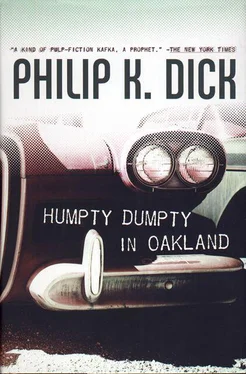“Right,” he said, making his way to his car and getting into it. As soon as he had sat down again he felt better; some of the weight left him.
That God damn smog, he thought as he started up the car. It really is hard to breathe anymore. And the smog, he saw, had begun” to blot out the colors of the buildings. San Pablo did not go on nearly as far now; it cut off in the haze and he could not see downtown Oakland as he had been able to just a few minutes before. But who cares? he asked himself as he drove out into traffic. I’ve seen downtown Oakland.
Up in the Oakland hills there would not be so much smog anyhow. That’s why they live up there, he told himself as he drove along a main street, in an eastwardly direction. He did not know the street, but it had a bus line running along it, so it had to go through to Broadway. I’ll turn left on Broadway, he decided, and that’ll take me clear out to Piedmont. Then I won’t have any trouble after that.
Sure enough, the street at last came out on Broadway. And now, as he drove toward the intersection with McArthur, he noticed that the smog had fallen behind. They wouldn’t let it get up here, he told himself with pleasure. There’s probably a zoning law against it. At that, he laughed to himself, feeling better once more. The vitamins had helped already. The clean air gave him back his ability to breathe, and the vitamins his strength. He patted his coat pocket, the bankbook and checkbook. Hot dog, he said to himself. This is going to be something.
At McArthur he turned right, then left onto a long tree-lined residential street. Now there was almost no traffic. The noise fell away behind him and he slowed, aware of the peacefulness of the neighborhood. Piles of leaves in the gutters, waiting to be burned. A parked milk truck. Gardener at work, old jeans and sweatshirt, clipping the edge of a lawn. Fergesson drove in second gear up the hill, past larger houses. Iron fences, ivy . . . he searched for the house. This street, wasn’t it? He craned his neck to see back. High stone wall, the poplar trees. Had he passed it?
He made out a street sign. Wrong street; not there yet. Picking up speed, he turned right.
Warm, he thought. Sun streamed down on him, on the sidewalk. The tie, too, made him hot; his neck had become slippery within the tight collar. With his left thumb he loosened it by stretching it still buttoned. And the car heater; it was on. He bent to switch it off…
A crash threw him forward and against the steering wheel. His head banged and his hands went out, hitting the windshield. He bounced back and lay hunched down, openmouthed. The car had stopped. The motor was dead.
Ahead of him a great heavy white Chrysler was stalled with its front fender locked into his. And out of the Chrysler the driver, stepping rapidly, was shaking his fist and yelling with no sound. A woman, the old man realized. A thin woman in a long brown coat, angry, scared, hurrying toward him.
“Do you see what you did?” Her face, shaking, broke into being at his window, an inch from his own. He rolled the window down. “Look what you did; my God, what’ll my husband say?” She dropped away, falling to see the fender. “Oh my God, look at it.”
Numbly he managed to get out onto the street. Other cars had stopped. The street, now, was blocked. His car and the woman’s car blocked it completely, because of the solid row of parked cars on each side.
“Look.” Her whole body was shaking. “And I have to pick him up at one-thirty. It’s your fault; you were driving in the middle of the street; you didn’t even see me. Did you hear me honk my horn? You didn’t look up; you were looking down —you weren’t looking at all, or paying any attention.”
“No,” he said.
“Don’t just stand there,” she said, staring at him. “Do something. Get them apart.” She walked off and then got back into her car: Then, all at once, she was out again. He could not keep track of her; she was already back beside him. “Will you do something? Or are you just going to stand there?”
He squatted down and peered sightlessly at the two fenders. His mind was empty; he had no plan or notion of what to do.
Behind him the woman said, “I could just kill you. Don’t you know how to drive? In ten minutes I have to be at the Claremont Hotel; I’ll never make it now. Will you call a tow truck? I want your license number.” She ran back to her car to find something to write on. Fergesson groped at the fenders. One of the cars would have to be jacked up.
“Are you insured?” the woman said, returning. “I suppose not; they never are. I’m going over to that house and phone for a cab. I have your license number now.” She left; he saw her hurry up the path to the front porch of the house and begin ringing the bell. After a moment he returned his attention to the two fenders.
A man, coming up beside him, said, “Need a hand?”
“No,” Fergesson said. “Thanks.”
“Want me to call a tow truck?”
“No,” he said. Going to the trunk of his car he got out the jack. Then he opened the trunk of the Chrysler and lifted out the larger Chrysler jack. With the two he raised the front end of the Chrysler. The fenders were still interlocked. Kneeling, he let the air out of the front tires of his Pontiac. With a sigh, the Pontiac gradually settled. The old man took hold of the bent green fender of the Pontiac and tore at it. The metal gave at last and the two cars were free.
He threw the jacks back into the cars and made his way down the path to the house where the woman had gone. The front door was open: he could see the woman at a telephone in the hallway. The owner of the house, another woman, appeared. “Tell her she can drive,” the old man gasped. Turning, he walked back up the path, away from the house.
The woman driver appeared, still pale and shaking. “Thanks very much,” she said icily.
“I got them apart.” He fumbled in his wallet; his fingers were so stiff that they seemed about to crack open. “I’m giving you my business card.”
She snatched the card away from him and hopped into her Chrysler. Its engine started and she drove off, the car swerving from side to side and then disappearing at a corner.
The other cars that had stopped began to go again. The man who had offered to help him remained, however. His small foreign car was parked in a driveway. “What about your car?” he said. “You have two flats.”
“I can make it,” the old man said. “I run a garage. That’s the card I gave that lady. My garage card.”
“I see,” the man said. “Well, good luck.” He got awkwardly back into his foreign car. “So long.”
By himself, Fergesson pushed his Pontiac from the street, over to the curb. It blocked two driveways, but now traffic could get past. They actually could get by anyhow, he told himself. They just stopped to rubberneck. The bastards. It doesn’t matter to them if I get a ticket for leaving my car like it is. But there was nothing else he could do.
He was not far from Mr. Harman’s house, and so he began to walk along the sidewalk, not even stopping to get back his breath. Red specks dipped in front of his eyes, and his throat burned. As he walked he breathed through his mouth, great windy gasps that startled two people passing him. He grinned at them and continued on. I only got about a block to go, he said to himself. Already he thought he could see the house, and he could get onto the grounds from this end; he could cut across and save walking.
Yes, he thought; there it was. A truck was parked in front of it, Harman’s truck; it had the name of the record business on it. So he knew he was right. This was the place at last. Going from the sidewalk onto the grass he climbed toward a terrace of roses; he did not try to find the flagstone path. He did not have the time. I have to go right in there, he told himself. I have this big business deal to conclude with them; I can’t afford to wait. Now he scrambled up between trees. Not with something like this. He clutched at his coat to be sure his checkbook and passbook were safe.
Читать дальше










